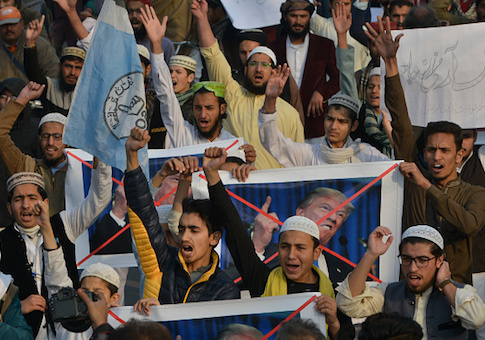Pakistan has said it is no longer allied with the United States after the Trump administration severed security-related aid to Islamabad over charges that the country is harboring militants, signaling a further deterioration of relations with the longtime counterterrorism partner.
The rift raises concerns for U.S.-led operations in Afghanistan, where American coalition troops rely on Pakistani air and ground routes to move personnel and supplies. But officials in Washington and Kabul have long held that Pakistan is playing a double game in Afghanistan given the country's ties to the Taliban's Haqqani network, which is responsible for several large-scale attacks on Afghan cities.
Tensions came to a head on Thursday when the Trump administration announced the suspension of up to $2 billion in U.S. aid, three days after President Donald Trump took to Twitter to accuse Pakistan of giving the United States "nothing but lies and deceit" and providing "safe haven to the terrorists we hunt in Afghanistan."
The question regional experts are now asking is whether the United States can punish Pakistan without punishing itself and vice versa.
"The fact that we've been getting a raw deal is very plain to see," said Daveed Gartenstein-Ross, a senior fellow at the Foundation for Defense of Democracies.
"But through two administrations, the Bush administration and the Obama administrations, we haven't really had a solution to the complex game that Pakistan has been playing that's very harmful to U.S. interests."
Washington has sent more than $33 billion in assistance to Islamabad since 2002, but that aid has dropped off over the years as Pakistan has drifted closer to regional partners such as China and Iran.
An administration official told the Washington Post on Friday the U.S. aid suspension freezes about $2 billion in aid, which includes $900 million designated to reimburse Pakistan for supporting the U.S. coalition in Afghanistan. The official said the administration's goal is to compel Pakistan to clampdown on the Taliban and affiliated militants that have been granted safe haven in Pakistan for over a decade.
Stephen Tankel, a senior fellow at the Center for a New American Security, said the best outcome is the administration's compellence works, though he warned that Pakistan has often done just enough to keep aid flowing only to delay real reform until a later date.
He said Pakistan could also respond by closing off air space to the United States, which risks further retaliation by the Trump administration. Though Tankel said this could lead to an "escalation spiral," he said that's not necessarily a bad thing.
"I'm not opposed to the potential for escalating coercion with Pakistan, but that escalation should be well thought out in advance," Tankel said. "The United States should know what its own redlines are, it should identify off ramps, and coercion should be paired with some sort of positive engagement as well. If the only thing the United States is going to bring to the table is a hammer it may be disappointed when that tool doesn't work."
